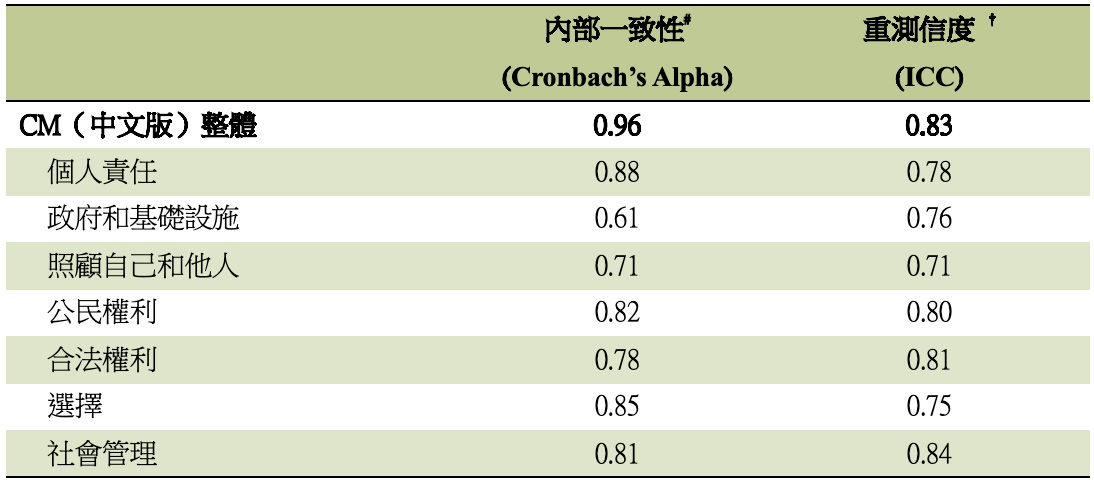公民測量表(中文版):在中國成年復元人士的內部一致性與重測信度
Wong, F.Y.Y., Wong, K.K.L., Lam, P.C.W., Chin, L.Y., Fung, T.C.T., Rowe, M. The Chinese version of the Citizenship Measures: Internal consistency and test-retest reliability among Chinese adults in mental recovery. American Journal of Psychiatric Rehabilitation 2025; 28(5): 1185-1193. https://ajprui.com/index.php/ajpr/article/view/583/454
背景及簡介
公民身分被定義為個人與社會給予的權利、責任、角色、資源和關係(又為5R)之間的緊密連結,以及透過公共和社會機構及生活連繫所獲得的歸屬感(Rowe, 1999)。透過在服務中採用復元模式和復元公民概念的方法,為復元人士提供的照顧可以更加全面、多樣化和有效,以滿足個人不同的精神健康需求。
從2020年起,利民會開始將復元公民概念融入社區精神健康服務,並開展復元公民計劃。因此,需要有一個經過驗證的中文版公民測量工具來評估服務使用者和參與計劃人士與5R的連結,以及會內復元公民工作的優勝之處和需要改善的地方。
研究時期
2019年3月至7月
目的
開發中文版本的公民測量表(CM(中文版))。
邀請正接受社區精神健康服務的復元人士進行內部一致性和再測信度測試,來評估CM(中文版)的可靠性。
方法
翻譯
把原英文版的公民測量表(Rowe et al., 2012)翻譯成中文,然後再翻譯回英文。
經原英文版本的開發者審閱及提高翻譯的準確性。
八位服務使用者和兩位精神健康服務同工對中文版本進行了預先測試,並進行了認知訪談,以了解他們對測量表題目的看法。
修訂任何被認為不正確、冒犯和難以理解的題目和詞彙。
前導測試
與原英文版相同,CM(中文版)包含了46條題目,並分為七個範疇,包括:個人責任、政府和基礎設施、照顧自己和他人、公民權利、合法權利、選擇和社會管理。
年齡在18歲或以上、正接受利民會精神健康服務,並能用粵語溝通的復元人士獲邀參與CM(中文版)的前導測試。
共進行了兩次測試,第二次測試在首次測試後四周進行。
結果
共有212位服務使用者填寫了CM(中文版)。其中101人在第一次評估的四周後再完成了相同的 CM(中文版)評估。
CM(中文版)表現出優異的內部一致性 (Internal Consistency),整個CM(中文版)的克隆巴赫係數 (Cronbach’s Alpha)為 0.96。七個範疇的 Alpha範圍為 0.61 - 0.88(表1)。
CM(中文版)亦具有良好的重測信度,整個CM(中文版)的組內相關係數 (ICC)為 0.83。七個範疇的 ICC為 0.71 - 0.84(表1)。
表1. CM(中文版)的內部一致性與重測信度

#內部一致性:測驗中項目之間的相互關係或同質性程度,使得它們彼此一致並測量相同的事物。
†重測信度:第一次和第二次各範疇的一致性。
212位服務使用者的整體公民平均分數為3.38 ±0 .64(最高可能分數: 5)。受訪者在“選擇”上的平均分數最高(3.54 ± 0.70),而在“社會管理”上的平均分數最低(3.14 ± 0.78)。
受訪者特質方面,只有年齡與“照顧自己和他人”的分數有顯著相關性(r = 0.15,p = 0.027)。隨著年齡增加,“照顧自己和他人”的分數也隨之增加。
結論
這項研究確認了 CM(中文版)在香港的復元人士中使用的內部一致性和重測信度。測量表可用於評估七個範疇並比較介入計劃前後的公民得分,從而有助於鎖定服務使用者所需要的服務,並定立服務發展方向和需要完善的地方。
整體公民平均分數顯示,服務使用者僅「有時」將自己視為社區公民或參與公民的相關活動。 5R,即權利、責任、角色、資源和關係的體驗程度為一般。
參考文獻
Rowe, M. (1999).Crossing the border: Encounters between homeless people and outreach workers. University of California Press, Berkeley.
Rowe, M., Clayton, A., Benedict, P., Bellamy, C., Antunes, K., Miller, R., Pelletier, J.-F., Stern, E., & O’Connell, M.J. (2012). Going to the source: Creating a citizenship outcome measure by community-based participatory research methods.Psychiatric Services, 63(5), 445-450.
Wong, F.Y.Y., Wong, K.K.L., Lam, P.C.W., Chin, L.Y., Fung, T.C.T., Rowe, M. The Chinese version of the Citizenship Measures: Internal consistency and test-retest reliability among Chinese adults in mental recovery. American Journal of Psychiatric Rehabilitation 2025; 28(5): 1185-1193. https://ajprui.com/index.php/ajpr/article/view/583/454
背景及簡介
公民身分被定義為個人與社會給予的權利、責任、角色、資源和關係(又為5R)之間的緊密連結,以及透過公共和社會機構及生活連繫所獲得的歸屬感(Rowe, 1999)。透過在服務中採用復元模式和復元公民概念的方法,為復元人士提供的照顧可以更加全面、多樣化和有效,以滿足個人不同的精神健康需求。
從2020年起,利民會開始將復元公民概念融入社區精神健康服務,並開展復元公民計劃。因此,需要有一個經過驗證的中文版公民測量工具來評估服務使用者和參與計劃人士與5R的連結,以及會內復元公民工作的優勝之處和需要改善的地方。
研究時期
2019年3月至7月
目的
開發中文版本的公民測量表(CM(中文版))。
邀請正接受社區精神健康服務的復元人士進行內部一致性和再測信度測試,來評估CM(中文版)的可靠性。
方法
翻譯
把原英文版的公民測量表(Rowe et al., 2012)翻譯成中文,然後再翻譯回英文。
經原英文版本的開發者審閱及提高翻譯的準確性。
八位服務使用者和兩位精神健康服務同工對中文版本進行了預先測試,並進行了認知訪談,以了解他們對測量表題目的看法。
修訂任何被認為不正確、冒犯和難以理解的題目和詞彙。
前導測試
與原英文版相同,CM(中文版)包含了46條題目,並分為七個範疇,包括:個人責任、政府和基礎設施、照顧自己和他人、公民權利、合法權利、選擇和社會管理。
年齡在18歲或以上、正接受利民會精神健康服務,並能用粵語溝通的復元人士獲邀參與CM(中文版)的前導測試。
共進行了兩次測試,第二次測試在首次測試後四周進行。
結果
共有212位服務使用者填寫了CM(中文版)。其中101人在第一次評估的四周後再完成了相同的 CM(中文版)評估。
CM(中文版)表現出優異的內部一致性 (Internal Consistency),整個CM(中文版)的克隆巴赫係數 (Cronbach’s Alpha)為 0.96。七個範疇的 Alpha範圍為 0.61 - 0.88(表1)。
CM(中文版)亦具有良好的重測信度,整個CM(中文版)的組內相關係數 (ICC)為 0.83。七個範疇的 ICC為 0.71 - 0.84(表1)。
表1. CM(中文版)的內部一致性與重測信度

#內部一致性:測驗中項目之間的相互關係或同質性程度,使得它們彼此一致並測量相同的事物。
†重測信度:第一次和第二次各範疇的一致性。
212位服務使用者的整體公民平均分數為3.38 ±0 .64(最高可能分數: 5)。受訪者在“選擇”上的平均分數最高(3.54 ± 0.70),而在“社會管理”上的平均分數最低(3.14 ± 0.78)。
受訪者特質方面,只有年齡與“照顧自己和他人”的分數有顯著相關性(r = 0.15,p = 0.027)。隨著年齡增加,“照顧自己和他人”的分數也隨之增加。
結論
這項研究確認了 CM(中文版)在香港的復元人士中使用的內部一致性和重測信度。測量表可用於評估七個範疇並比較介入計劃前後的公民得分,從而有助於鎖定服務使用者所需要的服務,並定立服務發展方向和需要完善的地方。
整體公民平均分數顯示,服務使用者僅「有時」將自己視為社區公民或參與公民的相關活動。 5R,即權利、責任、角色、資源和關係的體驗程度為一般。
參考文獻
Rowe, M. (1999).Crossing the border: Encounters between homeless people and outreach workers. University of California Press, Berkeley.
Rowe, M., Clayton, A., Benedict, P., Bellamy, C., Antunes, K., Miller, R., Pelletier, J.-F., Stern, E., & O’Connell, M.J. (2012). Going to the source: Creating a citizenship outcome measure by community-based participatory research methods.Psychiatric Services, 63(5), 445-450.





